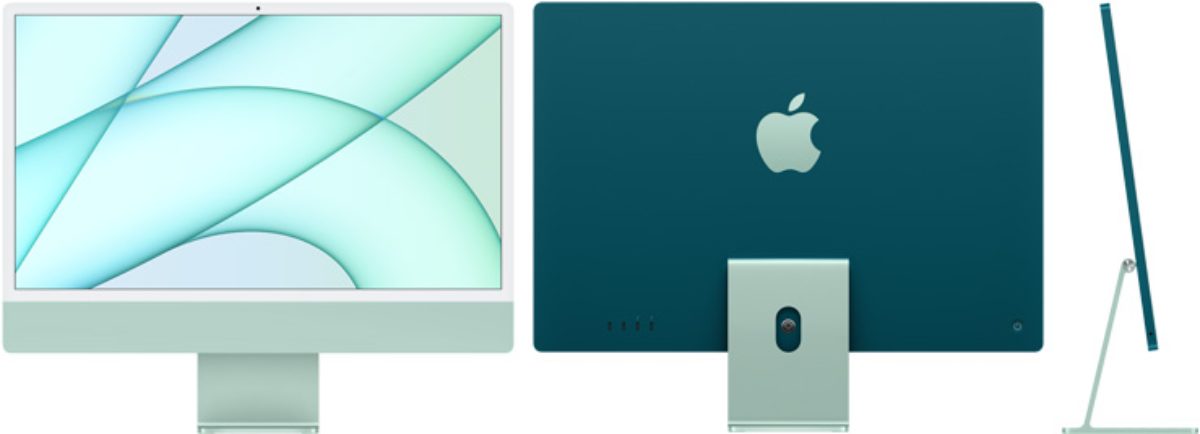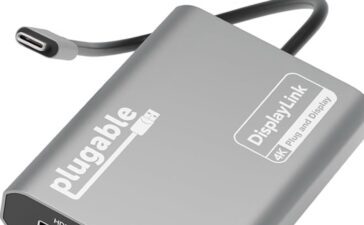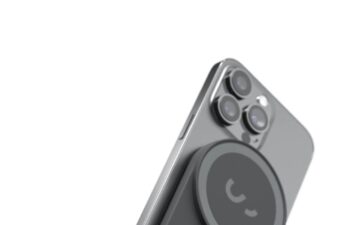The gang at iFixIt — who tear apart electronic gadgets and look at their innards so you don’t have to — say, in their teardown of the new 24-inch iMac, that it’s a “desktop only Jony Ive could love.” I hate to disagree, but I think the new all-in-one is one that almost all consumers (including me) will love.
The most obvious change to the iMac in years is the variety of color options Apple is offering. Harking back to its beginnings, it comes in a variety of colors: green, yellow, orange, pink, purple, blue, and silver (I chose blue). As Apple describes it, it features “softer colors and thinner borders on the front to allow users to focus on their content, while the back pops in bold, saturated color.” Hey, the colors bring back the fun element to the Mac platform.
As for the display, it’s gorgeous. The 24-inch 4.5K Retina screen has narrower borders, 1.3 million pixels, a P3 wide color gamut, over a billion colors, and 500 nits of brightness. This new display also features True Tone technology, which automatically adjusts the color temperature as the environment changes for a more natural viewing experience.
In addition, the 4.5K Retina display on the new iMac has an anti-reflective coating for greater comfort and readability. It’s effective, but doesn’t match the nano texture finish Apple offered as an option on the 2020 27-inch iMac. Then again, that finish cost an extra US$500.

Admittedly, the 24-inch iMac’s display isn’t as impressive at that of the 27-inch model with its 5120 x 2880 resolution. But the new all-in-one’s 4480 x 2520 resolution is impressive. Photos look great, and viewing movies on it is a pleasure.
Speaking of watching movies, doing so and listening to music on the new iMac is abetted by fantastic speakers. Apple says the 2021 all-in-one features the best sound system ever in a Mac. I’ve owned LOTS of Macs, and that’s no empty boast. It has two pairs of force-cancelling woofers placed side by side for solid bass response with no vibrations.
Each pair is balanced with a high-performance tweeter. The result, as Apple boasts, is a six-speaker sound system that producesamassive sound stage with strong, articulate bass, crystal-clear mids and highs, and plenty of volume. The new iMac even supports spatial audio when playing video with Dolby Atmos.
The revamped all-in-one really ups its game when it comes to the FaceTime camera, as well. The camera is 1080p compared to most Macs’ paltry 720 cameras (of course, 4K would have been nice). The new iMac also takes advantage of the image signal processor in the M1 chip and the Neural Engine to provided enhanced camera image quality with better noise reduction, greater dynamic range, and improved auto exposure and white balance.
Apple says that, to complement the camera, the new iMac features a studio-quality three-microphone array for clearer calls and voice recordings, “the best ever in a Mac.” The mics are positioned to reduce feedback from the rest of the system, while directional beamforming allows them to better ignore background noise and focus on a user’s voice. Conversations on FaceTime and Zoom calls are crystal clear, but, though I’m not a podcaster, I expect serious podcasters will want/need an external mic.
Some folks have noted that the 24-inch iMac does kinda resemble a giant iPad on a stand. But what’s wrong with that? Its volume is 50% smaller than the previous 21.5-inch iMac. It takes up less space, fits in more spaces, and is easy to move about your house or office should you desire.
The new all-in-one reduces the thick borders around the edge of the screen so that the entire body of the computer now measures just 21.5 inches wide, compared to 20.8 inches for previous generations. It’s just 11.5mm thick. And it only weighs about 10 pounds.
I also like the iMac’s new power connector that attaches magnetically with a woven 2-meter-long color-matched cable. But don’t think it’s the missed-by-many MagSafe cable that once came with Mac laptops. Unlike that connector, which popped off if it was nudged (to prevent the laptop from crashing to the floor), the iMac’s cable requires a bit of effort to remove it.

Every iMac features two Thunderbolt ports. The 8-core iMac configuration (which I highly recommend though it costs more) offers two additional USB-C ports and features a 1Gbps Ethernet port in the power adapter.
Now let’s address the elephant in the room: the complaint by some that the iMac “only” has an M1 processor. Folks were expecting (hoping for) an updated version of the Apple-made processor, but this desktop still has more than enough power for most folks.
I find it a bit ironic that a popular opinion (and one with which I agree) is that the M1-equipped iPad Pro has incredible processing power that’s hampered by iPadOS’s limitations. However, the M1-equipped iMac doesn’t have that drawback as it’s running macOS Big Sur.
I have an all-in-one iMac with 16GB of RAM and a 1TB SSD —and it blazes through my day-to-day work. That work involves having these apps open: Safari (with multiple tabs), Pixelmator Pro, Messages, Pages, Mail, and often Music. After three days of use, I’ve yet to experience a hiccup in performance on my new desktop.
The Magic Keyboard also gets a bit of a redesign. In addition to colors matching your all-in-one, the corners are rounder and the function keys are reorganized. But the big news is that it adds a Touch ID button bringing Touch ID to a Mac desktop peripheral for the first time. This is a welcome addition, especially since we’re still waiting for a Mac with Face ID
The bundled Magic Mouse also comes in matching colors. It looks good, but sadly, doesn’t address its most glaring problem: the charging port is still on the bottom. Which means you can’t use it while it’s charging. Plus, flipped over to juice up makes it look like an upside-down, legless turtle.
Another design issue: the new iMac still doesn’t allow you to adjust the height of the screen, or even rotate the stand to adjust the viewing angle.
If you were hoping that the iMac’s “chin” would disappear, you’re out of luck. It’s smaller, but it’s still there and housing the fanless M1 logic board, which helps add to the svelte design of the all-in-one. I do miss the Apple logo on the chin.
By the way, the headphone jack has moved from the back of the iMac to the bottom left-hand corner of the display, on the side edge. That’s an improvement as you no longer have to stand or move the Mac to plug in wired speakers or headphones.
Despite some flaws, I think the new iMac is the best desktop Apple has ever made. Its eye-popping screen, power, and sound system will be perfect for most users.
The iMac with 7-core GPU starts at US$1,299 and $1,249for education, and is available in green, pink, blue, and silver. It features an 8-core CPU, 8GB of unified memory, 256GB SSD, two Thunderbolt ports, Magic Keyboard, and Magic Mouse.
The iMac with 8-core GPU starts at $1,499 and $1,399 for education, and is available in green, yellow, orange, pink, purple, blue, and silver. It features an 8-core CPU, 8GB of unified memory, 256GB SSD, two Thunderbolt ports, two additional USB 3 ports, Magic Keyboard with Touch ID, Magic Mouse, and Ethernet.
Additional technical specifications, configure-to-order options, and accessories are available at apple.com/mac.
Review overview
The Pros
- Looks great
- plenty of processing power
- excellent display and speakers
The Cons
- Low-end models have a dearth of ports
- mouse design still wonky
- still has a chin
summary
9.5If you’re a desktop fan like me, the 24-inch iMac is the world’s best all-in-one. At least until Apple introduces a new 27-inch (or bigger) model.





